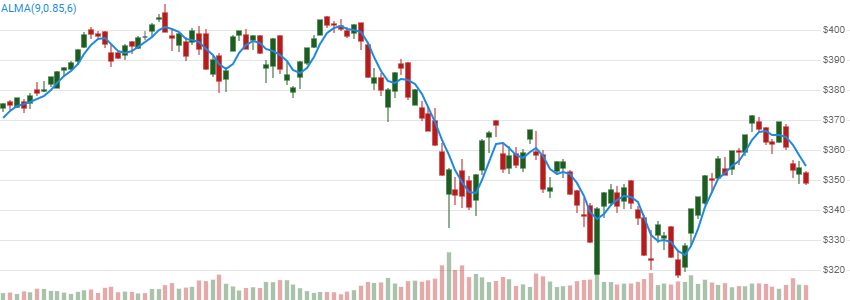Arnaud Legoux Moving Average (ALMA)
Created by Arnaud Legoux and Dimitrios Kouzis-Loukas, ALMA is a normal Gaussian distribution weighted moving average of price. [Discuss] 💬

// C# usage syntax
IEnumerable<AlmaResult> results =
quotes.GetAlma(lookbackPeriods, offset, sigma);
Parameters
lookbackPeriods int - Number of periods (N) in the moving average. Must be greater than 1, but is typically in the 5-20 range. Default is 9.
offset double - Adjusts smoothness versus responsiveness on a scale from 0 to 1; where 1 is max responsiveness. Default is 0.85.
sigma double - Defines the width of the Gaussian normal distribution. Must be greater than 0. Default is 6.
Historical quotes requirements
You must have at least N periods of quotes to cover the warmup periods.
quotes is a collection of generic TQuote historical price quotes. It should have a consistent frequency (day, hour, minute, etc). See the Guide for more information.
Response
IEnumerable<AlmaResult>
- This method returns a time series of all available indicator values for the
quotesprovided. - It always returns the same number of elements as there are in the historical quotes.
- It does not return a single incremental indicator value.
- The first
N-1periods will havenullvalues since there’s not enough data to calculate.
AlmaResult
Date DateTime - Date from evaluated TQuote
Alma double - Arnaud Legoux Moving Average
Utilities
See Utilities and helpers for more information.
Chaining
This indicator may be generated from any chain-enabled indicator or method.
// example
var results = quotes
.Use(CandlePart.HL2)
.GetAlma(..);
Results can be further processed on Alma with additional chain-enabled indicators.
// example
var results = quotes
.GetAlma(..)
.GetRsi(..);